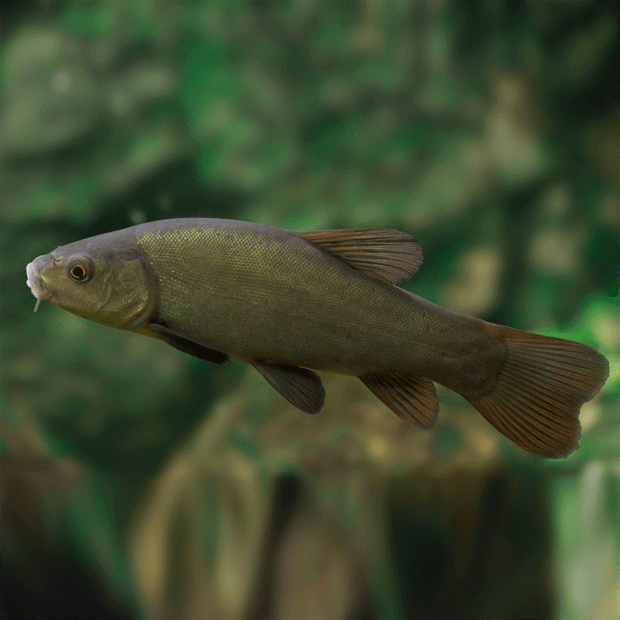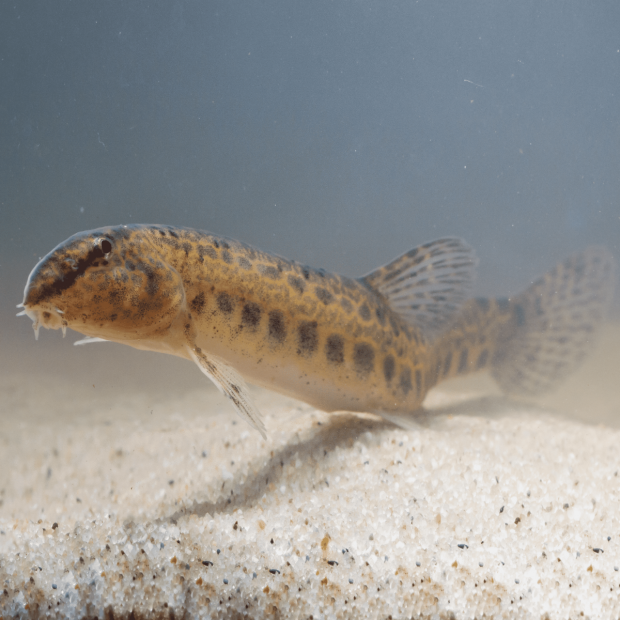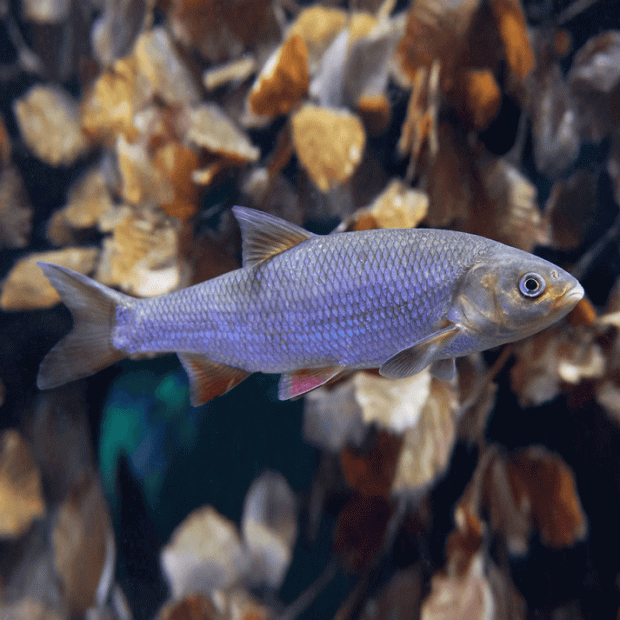- Easy-to-keep, bottom-dwelling pond fish
- Native to the UK
- Suitable for medium and large ponds
Overview
Everything you need to know about Golden Tench, at a glance:
- Common Names: Doctor Fish
- Scientific Name: Tinca tinca
- Max Size: 30-50cm
- Temperature Range: 10-24°C, though can survive temperatures close to freezing
- pH Range: 6.5-8.0
- Compatibility: Peaceful, can be kept alongside other pond fish
- Area Of Origin: Widespread throughout Eurasia, including British Isles
- Suitable Foods: Variety of sticks, pellets, and flakes
- Special Requirements: As bottom-dwelling fish, Tench prefer sinking foods
What is a Golden Tench?
Tench are bottom-dwelling, freshwater fish native to the UK. They’re known to scour the lower reaches of canals, rivers, and ponds in search of food. They come in several different varieties, but the most common are golden, a line-bred colour morph, and green, a wild-looking type.
Tench come from environments with slow-moving water and lots of vegetation. For this reason, Tench make fantastic additions to overgrown wildlife ponds. That said, with adults often reaching sizes of ~50cm they do need to be kept in medium to large-sized ponds.
When fully grown, Tench have a stocky, rounded body with a narrow face. Their body scales are very small. Those on their backs are modified, forming pseudo spines that are sharp to the touch. This golden variety has a pale yellow to orange base colour and brown speckles that cover the entirety of its body, including its head.
How do I care for Golden Tench?
Tench are medium-sized, hardy fish that can adapt to a wide range of aquatic environments. This makes them a fantastic first choice of fish for beginner pond keepers who aren’t yet ready to take on the task of keeping larger, finnicky fish like Sturgeon and Sterlet.
An important thing to consider if you’re planning to keep Tench is that they’re bottom feeders. While they will learn to come to the surface for food, they’re best fed a diet of sinking pellets. You can also offer them high-protein foods as a substitute for the live insects they’d eat in the wild.
Tench also thrive in a heavily-planted pond with lots of submerged, emergent, and floating pond plants. These plants make them feel safe by giving them places to hide. To make Tench feel even more confident, keep them in groups of three or more.
Another important thing to consider is filtration. While they’re not quite as messy as other fish, like Koi, they do produce a significant amount of waste. To make sure that this waste doesn’t pollute your pond, you’ll need a quality pond filter partnered with a suitable pond pump. Those with adjustable flow rates are best for Tench as they don’t like fast-moving water.
How is this Golden Tench delivered?
All of our aquatic animals are dispatched from our livestock distributor and delivered directly to your doorstep. Our distributor dispatches and delivers livestock packages Tuesday through Friday to avoid animals being in transit over the weekend. To further minimise time spent travelling, all livestock deliveries are made before 1pm on the day of delivery.
After placing your livestock order, you’ll receive all the information needed to track your livestock order via email. If you have any problems regarding delivery, or concerns about the health/wellbeing of your animal(s) upon arrival, please contact us, Swell UK Ltd, immediately, or at least within 48 hours of receiving your livestock order.
Any other, non-livestock items that you purchase alongside livestock will be sent via standard or express delivery and arrive at your delivery address in a different package. This means that, depending on when you place your order, you may receive your non-livestock items before or after your livestock package.
For a detailed breakdown of when you can expect to receive your livestock package depending on the day you placed your order, be sure to check the delivery details in the specifications below.
How do you acclimate a Golden Tench to a pond?
It’s very important that you acclimatise new fish to your pond. This is the process of gradually adjusting an animal to its new environment and it’s especially important in an aquatic setting where sudden changes in water temperature, pH, and nitrates can cause stress, illness and, in some cases, even death.
To acclimatise your Golden Tench, add it to a large, dimly lit container and add a small amount of pond water every few minutes. Do this until water temperatures in this container match water temperatures in your pond, and for at least 20 minutes. If you don’t have a large container to hand, you can float the bag containing your fish in your pond instead.
You should always set up your pond and make sure it’s ready for fish prior to purchasing any. It’s also a good idea to let your pond filter mature for a few months before adding Tench.
Above photos are for illustration purposes only; livestock received may not exactly match those photographed.
Livestock Delivery Timetable
| Order On | Receive On |
| Monday | Wednesday |
| Tuesday | Thursday |
| Wednesday | Friday |
| Thursday | Tuesday |
| Friday | Tuesday |
| Saturday | Tuesday |
| Sunday | Tuesday |
-
 GudgeonFrom £20.00In stock
GudgeonFrom £20.00In stock -
 Green TenchFrom £10.00In stock
Green TenchFrom £10.00In stock -
 Weather Dojo LoachFrom £10.00In stock
Weather Dojo LoachFrom £10.00In stock -
 Blue OrfeFrom £5.00In stock
Blue OrfeFrom £5.00In stock













